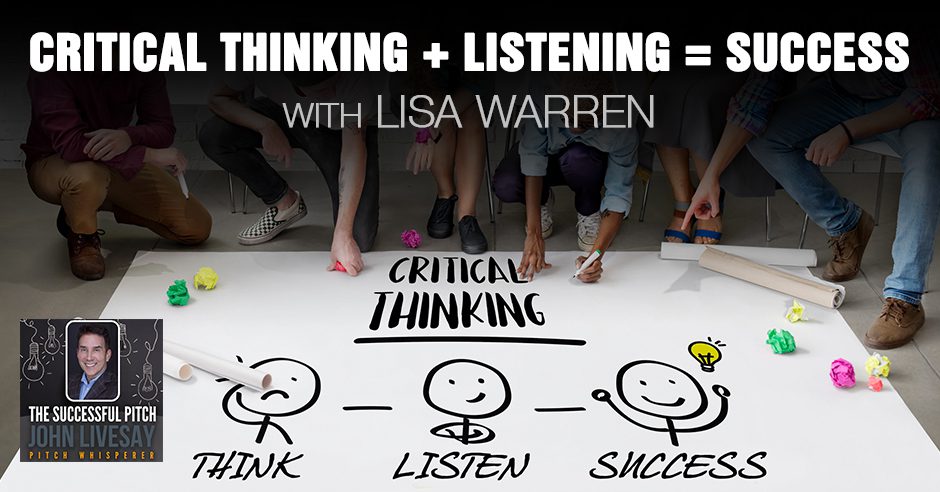Critical Thinking + Listening = Success with Lisa Warren
Posted by John Livesay in podcast0 comments

Episode Summary:
Critical thinking and listening are two of the most important skills you’ll ever have in any kind of business. This is according to Lisa Warren, a partner at SpeakInc, which helps meeting planner clients identify and retain the brightest, most relevant speakers in the business. Lisa shares how she ended up working with speakers. She takes us through her journey and motivation and job transitions. Lisa enlightens us that along with business transactions, building a relationship is the key to be successful.
—
Listen To The Episode Here
Critical Thinking + Listening = Success with Lisa Warren
Our guest is Lisa Warren, a partner at SpeakInc, which represents top speakers around the country. Lisa started her career as a sports marketer and went to law school. While being a speaking bureau representative, she’s now a partner at the firm. She said, “Critical thinking and listening are two of the most important skills you’ll ever have in any kind of business.” She explains how she wants to go out and, “be in the trenches with the clients to see firsthand what’s going on.” While she’s doing that, she’s also checking out new speakers to represent. Before joining SpeakInc in 1998, Lisa has held various positions in sports marketing and PR. She became a partner in 2000 and she’s a graduate of the University of Colorado and of Concord Law School. She enjoys reading, writing and running as opposed to reading, writing and arithmetic. Lisa, welcome to the show.
Thank you so much. Thanks for having me on.
We had the opportunity to meet at a mutual friend’s event and I just loved your energy. You have this ability to smile and light up the room and make people feel instantly welcomed. Take us back as far as you want. It could be childhood, college or whatever when you started on this journey of becoming you and getting interested in communication.
My undergraduate work was at the University of Colorado. I’m a Colorado native now based in San Diego for about 25 years, but I was born and raised in Colorado. I went to CU Boulder and majored in journalism. At that point in my younger days, I desperately wanted to be an intrepid reporter. Back then, the newspaper was a big goal. It’s not so much the hot medium now, but I wanted to be a newspaper reporter. Fast forward through my journey as a journalism student, I quickly realized that I wanted to pair my love of sports with my degree. I began working in the sports information department working with the media and writing media guides and so forth. Coming out of undergrad, I decided I wanted to work in sports. To make the long story short, it’s a very difficult business to work in, especially as a woman back in the late ‘80s and early ‘90s. I had a wonderful opportunity to work with the University of Florida after I graduated. I was there when Emmitt Smith was there. I worked in that big-time college sports realm and did a lot of traveling and made very little money.

Critical Thinking And Listening: If you’re in your dream job traveling around and working with athletes, you will not mind not making a lot of money.
At the time, I didn’t need a lot of money. I’m traveling around and working with athletes. Media was a dream job and I had a lot of fun at that. That’s where I started off applying my journalism skills, doing a lot of writing and interacting with the media. At some point, I realized that I need to make some money here. I begrudgingly left the sports world and I ended up in San Diego working for a company which is now called Vistage. Back then it was called TEC, The Executive Committee. It’s an organization that works and operates on the theme of being lonely at the top. They organize meetings of small to medium sized company owners. They work in monthly meetings and I would book the speakers that would come in for these monthly meetings. The groups were comprised of leaders of different industries. They weren’t competitors so they felt free and open to speak about their business issues and come together monthly. It was a good opportunity for me to work with folks who were trying to better their companies and their organizations for their employees. That’s how I started off working with speakers.
That’s a great transition from working with athletes to working with top CEO people because there are a lot of similarities, discipline, focus, passion and personalities that come into play around all of that. Law school somehow happened in between there. What was the motivation there? That’s not something that you just see people casually doing.
I had been speaking for fifteen years before I decided to go back to school. I left Vistage at some point and came to SpeakInc. I started booking speakers and working with clients which I loved, but at the time, I just needed another challenge so I decided to go back to law school part-time. Fortunately, there’s a completely online law school, which at that point was Concord. It’s now owned by Purdue University. It’s a global law school. I was able to keep my full-time job at speaking and satisfy my need to engage my brain in a different realm and do law school part-time. It was a great and crazy journey.
[bctt tweet=”Listening skills and critical thinking are key. Get in the trenches with your clients.” username=”John_Livesay”]
Most people have relationship challenges during law school and the pressure that only one of the three of you is going to make it and all of that drama that goes with it. How have you used your law degree in contract negotiations for the kinds of speakers you’re doing?
That was one of the things that’s intriguing to me because I didn’t want to get out of the bureau business. I love what I do. I’m a partner with the company and have now been here for over twenty years. I wasn’t looking to leave, but I was looking for something that would challenge me and also compliment what I do every single day and that is negotiating contracts. That was super helpful. Law school is a great way of focusing your brain and you’ll think differently after going to law school.
I’ll never forget my sister coming out of law school and saying, “I don’t mean it in a pejorative sense.” I said, “What does that word mean?” She said, “Condescending.” I’m like, “Let me get this straight. You’ve used a condescending word that only lawyers use to say condescending and you don’t mean to be condescending?” We’re in a whole other world here.
You do talk a lot about reasonableness and whatever a person would think. There is lingo but it does sharpen your listening skills and your critical thinking. That can be applied in any business. Working with clients from all different industries in various levels and speakers who come from lots of different backgrounds helped me. It sharpens another tool in the toolkit.
I love that Maslow quote that if the only tool in your toolbox is a hammer, you tend to go around looking for nails to hit. I use that in my keynote talks as it relates to selling. The only way you know how to sell and get someone to close a sale is one hammer. There’s a whole new skillset available. I wanted to double click on what you said, Lisa, about critical thinking because it’s so important in these times of disruption. Almost every industry that I’m speaking to is being disrupted from technology to healthcare you name it. I’m assuming that critical thinking is a key way to handle disruption for your business.

Critical Thinking And Listening: Working with clients from different industries in various levels and speakers from different background can sharpen another tool in your toolkit.
It’s dovetailing on what you were saying about the sale. This business like many businesses is very much relationship. It’s not transactional. We work with clients that we’ve worked with for twenty-plus years and we’re very proud of that, but it does take a lot of critical thinking. It takes creativity. You’ve got to be prepared to meet the various challenges that come up in creative ways. Especially when you’re working with a long-time client, things are going to come up and competitors are going to come into the view. If you’re not willing to be creative, think critically, and be innovative with the way you engage your clients, you’re going to be in trouble.
What are some of the things you’ve noticed in the last five years out of the twenty that are ways that require some innovation both from your position as well as the speakers that you bring in or expected to innovate in some ways.
There are a lot of factors. Technology always plays a role not just in the last five years but I remember ten or twelve years ago, everybody was worried about disintermediation. Now their clients can go directly to the internet and look for speakers directly. They’re like, “Our bureau’s going to go out of business.” Fortunately, that answer has been resounding, “No, there’s always going to be a place for bureaus who take good care of their clients, know their preferences, go above and beyond, negotiate on their behalf.” The internet and just the access to information can be overwhelming. Another challenge that we find is having worked with some of our clients for so many years. We’ve got to constantly be finding new and up and coming speakers, but they can’t be so new. We’re worried that 100% they’re going to deliver. That becomes a big challenge and it’s a good challenge to have because it means we’ve got clients that we’ve been working with fifteen to twenty years. We’ve just got to always be on the lookout for new and interesting people to put a put in front of them.
The innovation comes in two places is what I’m hearing you say. One, technology has provided some access that wasn’t previously available. It’s almost like a travel agent, “If I can book my own flights, do I need the travel agent?” Yet it’s still a human connection that needs to come through when a keynote speaker up in front of an audience. It needs to come through in relationships because the technology can be very impersonal. The other part of what you just said that I find so fascinating is, “Bring us new speakers but make sure they’ve got qualifications that you trust because we trust you. We can’t keep having the same speakers over and over again.” Your ability almost reminds me of what I see here in Los Angeles of what agents need to do.
[bctt tweet=”Law school is a great way of focusing your brain which makes you think differently.” username=”John_Livesay”]
We’re going to give somebody a role in a movie that’s never been in a movie before. They have a movie but they’ve never been the lead or wherever the criteria is that allows you to tap into talent. There are a lot of people that always want to take their business up to the next level who are our audience. We use the speaking as a metaphor for everyone, whether they want to be a speaker or are a speaker. The concepts of what you look for of the speakers that you decide are, worthy enough being on your platform and that you feel confident recommending. Let’s talk about how important a book is, for example, in terms of authority and credibility.
A book can be very important. There are a lot of clients who have been doing this for a long time. They’ll say to me, “Great, he’s got a book but a lot of people have a book. A lot of people have access to self-publishing. What else did we get?” One of the things I’m focusing on for 2019 was when I go out to visit clients, which we frequently do. We find it very important to get clients. We do so much over email and phone. We make it our business to get out and travel and see our clients as often as possible. Speakers are in the area that I can tack on a trip and go see a speaker that I haven’t seen live. I can report it back to my client having seen with my own eyes and heard with my own ears.
It’s whole different energy. You see the people in the audience responding. It’s very different than a demo video.
I find that it’s hugely helpful and clients appreciate our ability to report from the field so I’m making a big push for that this 2019.

Critical Thinking And Listening: There’s always going to be a place for bureaus who take good care of their clients, know their preferences, go above and beyond, and negotiate on their behalf.
I’ve read and heard so many executives talk about the importance of getting out behind their desk. Let’s say if you’re Howard Schultz and you serve coffee at Starbucks or you’re at a factory. You own a business that has a factory making clothes or whatever and you’re hearing from your employees directly. My experience has been that, whoever can explain the problem the best is who the clients think has the best solution. What I hear you doing is going and hearing the clients tell you firsthand or watching it and say, “This is a problem. You’re a healthcare professional or you’re a tech company. I see the competition’s coming from you that hasn’t been there before.” Now, you’re pulling all your people together to handle this problem that you saw firsthand when you visited your factory or office. I now have a much clearer sense of who I’m going to recommend as a speaker because I’ve either watched their demo reel or heard from other people that have come in. They know exactly what to say to this audience to help them with this specific problem because you understand the problem at such a deeper level.
Even just small things like being at a client conference behind the scenes and seeing what the challenges are with the AV or how the speaker reacts and if something doesn’t go quite right, I call it being in the trenches with my client. Meeting planners have a tough job. It’s very visible. When things go right, they’re a hero, but when things go wrong, it’s the exact opposite. It cements the relationship when I’m onsite with the client and in the trenches. If the speaker does great, we’re both heroes. If he bombs, I’m right here with you in the trenches and we’re going to survive it together and have some lessons learned. They appreciate that.
Arthur Ashe has this great quote about, “The key to success is confidence and the key to confidence is preparation.” When I’ve given a keynote talk, I was down in San Diego speaking to KPBS when they needed to learn how to pitch to get funding, not for the network, but for a whole building. It was not the normal way of raising money and they needed to justify why they needed a new building and they didn’t know how to do it. Towards the last fifteen minutes of my presentation, their projector stopped working. I was so prepared and knew what the next slide was that I could keep going without the visuals. I’ve never had to do that before and you hope that your preparation will be there when you need it. I feel happy that I keep going in that situation because I was so prepared and knew my material so well.
It’s one of those things that a lot of people take for granted. It can happen and when it does, if you can’t roll with the punches, it’s going to be a big issue.
[bctt tweet=”Businesses are very much about relationships; it’s not transactional.” username=”John_Livesay”]
What tips do you have when you are approaching a new client and saying, “I know you’ve got all you these options of which speaker bureau to use. Here’s what we do and say that separates us so that you’re not seen us as a commodity?” Do you have pitch tips that you could share with us?
There are lots of wonderful bureaus and the separation between the top is tricky because, for the most part, we can all book the same speakers. It’s not a product consideration in terms of who owns the product. It’s not a pricing consideration because, for the most part, all the speakers are quoting the same fees. It is a bit tricky. One of the things that separate us from most bureaus is that we don’t have any exclusive speakers. We have no speakers under contract that we’re obligated to book a certain number of times. That frees us up to hone in on what the client’s objectives are for the meeting. We focus on their budget and the topics thereafter. We can, with a clear conscience, recommend the best speaker based on their parameters. We don’t have to push any particular speaker. That’s not the case for a lot of bureaus. That’s one thing that sets us apart. We also have been in the business for quite some time. We’re one of the oldest bureaus. In terms of our staff, the least tenured person has been here for over ten years so we’re not old. We’re just seasoned and wise.
Your president is a great guy and he clearly sets a culture that attracts and retains talent. It’s a key factor because of the costs for not creating loyalty at a company based on Millennials, in particular, known for not staying loyal. The fact that you create that culture and if that’s a problem that your clients are having, then you go, “I have a speaker that can speak on that. I know myself what we’re doing to keep loyalty at all.” You’re leading and keeping it together.
It’s a good culture. The other thing that we try to communicate with our clients is we’re very flexible and very creative. For example, I’ve got several clients for whom I have crafted custom contract. It’s just a huge time saver when they come to me and we book a speaker. They don’t have to go round and round with their legal team because I book them classes that we’ve decided in advance. I try to keep it stocked up.

Critical Thinking And Listening: Meeting planners have a tough job. When things go right, they’re a hero, but when things go wrong, it’s the exact opposite.
The traditional marketing tools they talk about and the four Ps and all that good stuff. That product and pricing and PR and packaging. You’re talking about the unique challenges in the speaking bureau world that as you said, the product’s the same. We all have access to almost all the same speakers and all the pricing. It’s not like we’re going in and saying, “We can get to that speaker for less.” That’s not how the industry works. You have to tap into this relationship integrity mindset. You describe the fact that you don’t have exclusive contracts and have an obligation to promote this person X number of times a year, almost like a quota and what that means to your clients.
That’s my favorite phrase to give people a benefit statement. They’re like, “If you don’t have exclusive speakers, I still don’t get why that’s important to me or why I should care.” You did it so beautifully when you said, “What that means to our clients is it frees us up to match their needs to their budget without any potential conflict of interest or a pressure to push things.” It’s almost like a financial planner that’s incentivized to push people into a mutual fund because they get a high commission. None of that is happening to you. I see now why you and speaking are so successful. It’s because of the trust and the willingness to be in the trenches and then this additional element of integrity that comes into play.
It’s what we had to do. It is tricky because we all need and want to get our message out there in a way that’s not pushy and not heavy handed. Having been doing this for so long and being able to get that message out at the right time with the right people without sounding like a big commercial.
There’s a level of confidence that comes with experience. Whether it’s an experienced speaker that can promise you as a potential bureau that would represent them or when they get on the phone for those shootouts. When it’s between you and somebody else, if they’re going to hire or invest in or buy a product or service or in this case, as a speaker by you, it’s not so much about the credentials. No one’s going, “What law school did you go to? How many books did you sell?” It’s about, “Do you understand our problems enough to give us a unique solution that’s going to change our business? Do we like you and do we trust you?” I talk about all of that all the time. If people trust you first, then they get to like you and then they get to know you. That’s the relationship building that you were talking about.
It takes us out of this old school way of selling. Even beyond the consultative selling, which has been popular now to a whole other level of, “Let me tell you a story of someone else I helped at their events.” Once that story starts happening and you can bring that to life like, “The last time I was in the trenches with my client, what I found was.” Then suddenly you have a new way of communicating with potential event planners on why they should pick you over somebody else that they go, “Lisa has empathy for what I do. She knows another person that’s facing the same challenges and she’s there for that person. Now I found my bureau.”
The relationships that we’ve built with the speakers we work with a lot is a huge piece of it. We find ourselves connecting with clients saying, “I’ve worked with a speaker and he raved about you. He’s worked with you for ten years.” That’s having other evangelists and we do the same for our speakers too. If you worked with someone multiple times and you know they’re going to do a good job, I’ve told my clients, “I can almost give you money.”
That’s that personal passion and connection, yet you’re still challenged with finding a new speaker that has experience. That’s a relationship building that requires, “Let me talk to some other speaking bureaus that maybe represent you. Let me speak to a client and beyond just the testimonial they wrote to build your own confidence level in your mind before you can get to hear them live yourself.” All of those are steps that allow people to get into your ecosystem. Are there any last thoughts or inspirations you want to leave us with before we say goodbye?
This is a great industry. It’s a pie. There are a lot of players but it is a big pie. It’s never a dull moment. I enjoy the chance to chat with you about it.
Thanks. What you’ve said reminds me of our mutual friend, Tim Sanders, who’s an amazing speaker and author. He was kind enough to write the foreword to my book and he talks about the importance of having an abundance mindset instead of a scarcity mindset. I find that I gravitate towards people with the abundance mindset in business and in my personal life and we keep meeting more of each other. You build your tribe that way is how I liked it. If people are interested in finding out more about you, the website is SpeakInc.com. Lisa, thanks again for being such a great guest.
Thank you so much. Talk to you soon.
Links Mentioned:
Wanna Host Your Own Podcast?
Click here to see how my friends at Brandcasting You can help
Get your FREE Sneak Peek of John’s new book Better Selling Through Storytelling
John Livesay, The Pitch Whisperer
Share The Show
Did you enjoy the show? I’d love it if you subscribed today and left us a 5-star review!
-
- Click this link
- Click on the ‘Subscribe’ button below the artwork
- Go to the ‘Ratings and Reviews’ section
- Click on ‘Write a Review’
- JohnLivesay.com
- John Livesay Facebook
- John Livesay Twitter
- John Livesay LinkedIn
- John Livesay YouTube
